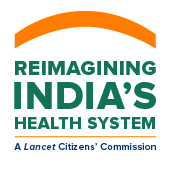In Conversation: Nikhil Iyer, Visiting Senior Public Policy Analyst, The Quantum Hub (TQH)
April 05, 2023

A lawyer by training, Nikhil entered the world of public policy as a Legislative Assistant to Members of Parliament (LAMP) Fellow in 2019-20. In his year as a LAMP Fellow, he understood the intricacies of how politics and political incentives for various actors affects policymaking in India, especially at the highest level. Since then, he has engaged with a range of policy issues in the areas of health, gender and labour, technology, climate change and sanitation. He has authored various opinion pieces and reports on these issues.
My work in the Commission pertains to understanding the political influences that affect how politicians and state institutions look at issues of healthcare, at the state level in India. Politicians, when they are in Government, deal with numerous competing interests. The prioritisation of issues, which is reflected in budget allocations and measures such as introduction of new laws, is dependent on factors such as the national and sub-national political incentives, political ideology, citizen movements and demand, the Central Government’s influence on policymaking in the area, external factors such as funding from global organisations, and so on.
My team’s work explores how these factors have impacted the development of health policy in the five Indian states of Tamil Nadu, Rajasthan, Andhra Pradesh, Bihar, and Jharkhand – which have seemingly prioritised health in recent years. By evaluating the journeys of these five states which are at different levels of socio-economic development and have vastly different political histories, we highlight insights which may drive similar action in healthcare in other similarly placed Indian states. These insights will potentially drive greater political attention and public resources to healthcare in Indian states.
There are several challenges but for me, one of the most critical is the necessity to make health a politically and electorally attractive issue. Politicians tend to have a curious outlook towards healthcare – they acknowledge its importance in driving human development and unlocking the demographic dividend in India, but are unwilling to expend budget and their political capital on it as it does not reap immediate electoral dividends for them. This is in stark contrast to the political will on display to distribute tangible goods such as electrical appliances. Even where they are willing to prioritise healthcare, there is a stark preference for pursuing health insurance schemes – which creates access to private hospitals but comes at the incredible opportunity cost of improving public healthcare.
Some scholars have also raised the question of whether the State should be involved in healthcare delivery at all – or limit its role to policy development, enforcement of quality standards, and supporting private entities with funds. I believe that in India, which has drastically different levels of infrastructure and socio-economic development across the country, the State has a strong role to play in healthcare delivery, especially in rural and remote regions. These are, in my opinion, opportunities for politicians to connect to their constituents in a most impactful way.
The challenge of making health a political and electoral issue can be viewed at both national level and at the state level in India. While in the past, national policies and schemes have affected how states dealt with healthcare, this is beginning to change now. Our research shows that regional political parties and politicians have achieved some success in making health an electoral issue, and have arguably changed voter expectations in the process.
Through its work across the diverse workstreams, led by prominent experts in the field of health policy, the Commission is contributing valuable scholarship to the discourse on health in India. Some of its unique projects, such as the pilot citizen survey on health as an electoral issue, will hopefully spotlight citizen demand for health, and prove especially relevant as India goes to Parliamentary Elections in 2024.
